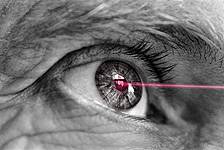The top 12 questions by patients to their eye doctors on cataracts.
Q1: What are cataracts?
A: A cataract is the clouding of the eye’s transparent lens, that results in blurry vision and vision loss. The best way to understand cataracts is to imagine what it feels like to look through a dirty window— the image will be difficult to recognize, both blurry and distorted.
Q2: How common are cataracts?
A: Affecting more than 20 million people, cataracts are one of the leading causes of blindness, worldwide.
- Cataracts are the most common cause of vision loss in people over the age of 60.
- Cataracts affect more than 50% of all adults above the age of 80.
- By age 60, more than half of all adults will begin to develop a cataract.
Q3: What does the eye’s lens do?
A: The main function of the eye’s lens is to ensure that light can pass through, in order to focus on the retina at the back of the eye. The lens is also responsible for adjusting the eye’s focus, to enable clear vision at all distances.
When driving your car, your lens changes focus so you can clearly see the street sign ahead, and then look down at your speedometer, and back to the road again. Your lens also enables you to watch a TV show and then look at your remote to change the channel— allowing you to see both objects clearly.
Q4: How does a cataract develop?
A: The eye’s lens is mostly made up of water and protein. The protein is naturally arranged to keep the lens clear and allow light to pass through efficiently. As we age, cataracts develop as the proteins collect together, and lose their transparency. This causes a ‘clouding’ of the lens, making it difficult to see clearly.
Q5: Are cataracts painful?
A: Cataracts do not cause pain, though they do cause frustration and discomfort from reducing vision clarity. They develop gradually over time, with symptoms going unnoticed for many decades.
If you have cataracts, contact an eye doctor near you, who can diagnose and discuss the best treatment options.
SEE RELATED: Can I Prevent Cataracts Naturally?
Q6: Do all cataracts develop as a result of aging?
A: The majority of cataracts develop due to the natural aging process. However, other types of cataracts due exist:
- Congenital cataracts are present at birth.
- Secondary cataracts can result from eye surgery or other ocular diseases, such as glaucoma or diabetes.
- Traumatic cataracts can develop from an eye injury.
Q7: Do I have a cataract?
A: The only way to know if you have a cataract is by scheduling a comprehensive eye exam with your eye doctor.
However, it is a good idea to be aware of the signs and symptoms of a cataract. Keep in mind though, each person is an individual and may experience symptoms differently, or with differing severities:
Common signs and symptoms of a cataract include:
- Blurry or cloudy vision
- Glare- sunlight, bulbs, headlights
- Seeing halos around lights
- Poor night vision
- Colors appearing less vibrant
- Double vision
Q8: How is a cataract diagnosed?
A: Cataracts can only be diagnosed through a comprehensive eye examination.
Your eye doctor will utilize diagnostic tools to measure the following:
- Visual acuity to determine to the extent at which a cataract may be limiting clear vision at all distances.
- Refraction will determine if your vision has changed— necessitating a new optical prescription for f eyeglasses or contact lenses.
- Evaluation of the lens using high magnification and illumination to identify the location and extent of any cataracts.
- Evaluation of the retina of the eye through pupil dilation.
Additional testing for color vision and glare sensitivity may be conducted as well.
Q9: How are cataracts treated?
A: Early symptoms of cataracts can be treated with specialized eyewear and optical prescriptions, such as anti-glare sunglasses, glasses with magnification lenses, or a stronger optical prescription.
When the cataracts begin to seriously affect your vision, cataract surgery will be recommended. When you notice your vision for performance of daily activities, such as reading, driving, watching TV or doing crafts, is significantly impaired, discuss your candidacy for surgery with your eye doctor.
Q10: Is cataract surgery safe?
A: Cataract surgery is one of the safest and most effective types of surgery.
Cataract surgery is a common, and relatively painless procedure that involves replacing your clouded eye lens with a clear, plastic intraocular lens (IOL) that contains an optical power to correct any refractive errors and improve vision clarity.
Over 90% of patients report improved vision following cataract surgery.
Q11: Will I need to wear glasses after cataract surgery?
A: During cataract surgery, the natural lens is replaced by an artificial intraocular lens (IOL). Prior to surgery, your eye doctor will calculate a precise measurement of your refractive error, in order to apply your optical power to your IOL.
In many cases, the IOL will provide 20/20 vision, without the need for glasses or contact lenses. Your ability to achieve 20/20 vision will depend on the type of IOL you choose, and how well your eyes adjust to the new lens.
Keep in mind that if you choose a monofocal IOL, for distance vision only, you may require glasses for near vision activities at some point— the opposite is true as well.
However, in some cases, reading glasses or multifocal progressive lenses may still be required for correcting mild residual refractive errors, or presbyopia. Your eye doctor will determine your optical prescription post-surgery, after your eyes have completely healed.
Many eye doctors recommend lenses with anti-reflective coating and photochromic lenses to further improve your vision and increase comfort post-cataract surgery.
Q12: What if I don’t have cataract surgery?
A: If you are nervous about the thought of having cataract surgery, you might decide that the procedure is not for you. Before making a final decision, it is important to understand that cataracts will only get worse overtime, progressively blurring your vision and even threatening vision loss.
Speak to your eye doctor about your concerns before deciding against this vision-saving procedure. In the meantime, there are other ways to improve your vision, such as:
- Adjusting lights to a brighter setting
- Wearing polarized sunglasses
- Wearing a wide-brimmed hat to reduce glare
- Utilizing magnifying lenses for improved near vision
LEARN MORE: Guide to Eye Conditions
If you are experiencing vision difficulties as a result of a cataract, schedule an appointment with an eye doctor to see how you can improve your vision, enhance your daily performance, and regain your independence.










